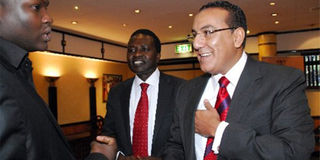Aerial study of Kenya’s total mineral wealth to be done by June next year

FILE | NATION
Mining Cabinet Secretary Najib Balala (right) and his Principal Secretary Richard Titus Ekai. The ministry is in the process of reviewing the mining law with the aim of increasing income from the sector.
What you need to know:
- The airborne survey is among the top pledges that Mining Cabinet Secretary Najib Balala gave when he assumed office last year.
An aerial survey meant to determine Kenya’s mineral wealth will be completed by June 2015, paving the way for creation of a mineral database that will be used to sell Kenya to investors in the extractive sector.
Speaking in a telephone interview with the Nation, Mr Titus Ekai, principal secretary in the ministry of Mining, said the government has already signed a memorandum of understanding with its Chinese counterpart that will guide execution of the planned survey.
“We expect the process to be completed in the coming financial year. We intend to conclude this as soon as we can. We have already signed a MoU with the Chinese government on carrying out the airborne survey,” said Mr Ekai.
New loan
The terms of the MoU are that the airborne survey will be carried out by a Chinese government institute, with the process being funded through a loan by the China government.
The government of Kenya will determine the type of data to be collected, the time the exercise will be conducted and the cost of the process.
Security of mineral data also remains a preserve of the government while the work of the Chinese institute will be subject to verification by an independent international expert panel appointed by the government.
The choice of Chinese aid in carrying out a survey to establish Kenya’s mineral wealth is bound to attract mixed reactions from sector players, given that Kenya has already discovered rare earth metals in Kwale.
In July last year, Cortec Mining Kenya Ltd that is licensed to mine in Mrima Hills, Kwale County, released laboratory results indicating that Kenya had Sh5.3 trillion worth of rare earth minerals.
The global market for rare earth minerals — which are used to manufacture circuits found in electronic devices — is 90 per cent controlled by China.
The Asian country has been accused by economies such as the USA of “unfairly” altering the global price of the mineral.
“The engagement is a tricky one but the government will need to ensure security of its data. The airborne survey will produce data that will be used to market Kenya to investors. The government can claim good revenue from rare earth metals through various ways, such as adjustment of royalties,” said Mr Osborne Wanyoike, senior manager for energy and mining at PricewaterhouseCoopers.
The airborne survey is among the top pledges that Mining Cabinet Secretary Najib Balala gave when he assumed office last year.
The process has, however, been delayed despite increased interest in the local extractive sector from international firms, especially after the first discovery of oil was made in March 2012.
The ministry of Mining is in the process of reviewing the mining law with the aim of increasing income from the sector.
The draft mining law through which the ministry is seeking to increase royalties to as high as 10 per cent has already received Cabinet approval, and is awaiting discussion in Parliament.
Through the draft law, the ministry is also seeking to establish corporations that will be market Kenya as a destination for investment in mining and also provide a vehicle for the government to invest at least 10 per cent stake in large mining projects.
Data from the Kenya National Bureau of Statistics indicates that earnings from mineral production rose to Sh27.6 billion in 2012 from Sh18.3 billion in 2011 due to a rise in the global price of gold.
Total mineral production declined from 1.69 million tonnes in 2011 to 1.45 million tonnes in 2012.





